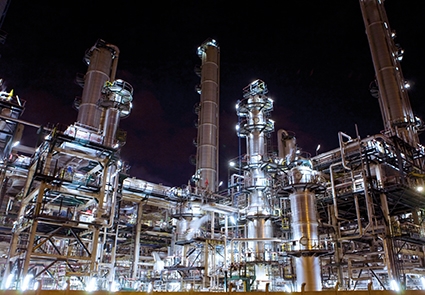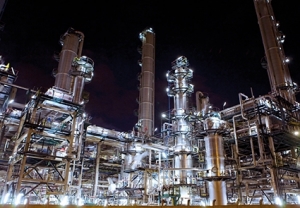Phasis Oil Refinery to Tackle Enviro Issues with Innovative Tech
PHASIS Oil company plans to build a high-technology oil refinery in Kulevi. Intense negotiations are underway with Spanish Technicas Reunidas regarding the construction, as it has participated in the building of more than 300 refineries worldwide. PHASIS OIL has also signed a memorandum on operating and management of the refinery with another experienced Spanish company, CEPSA, which owns three oil refineries in Spain. The oil refinery construction will have no harmful impact on the environment because PHASIS OIL plans to make use of the Isotherm technology of the world’s recognized chemical concern DuPont, a process whereby crude oil is 100% processed, leaving no solid waste and resulting in ecologically clean EURO5 standard petrol and diesel. The company developed this technology especially for oil refineries several years ago and established it in the USA. The Kulevi oil refinery will enable Georgia, as an oil importer, to become an independent country in terms of oil products and, moreover, to launch exports to a number of other countries.
PHASIS OIL director Gia Shavdia spoke about the project with Versia newspaper.
What got you interested in this project? What experience do you have in the field and who will build the Kulevi oil refinery?
I’ve been in the oil products business since 1992, living in Switzerland until 2014. In 2015, the Government of Georgia announced a tender and I was interested in it. I applied to Multiplex investment company for partnership, one of the strongest and most reliable finance groups, founded by Levan Kacharava, who has also operated in the oil products field for many years. He was one of the founders of the Silk Road Group and several years ago this group operated in the oil business. We initially offered the government to fully rehabilitate the Batumi oil refinery, but after a year, they decided that Batumi should be a resort zone and the oil infrastructure should be developed elsewhere.
In general, an oil refinery with scope on the international market should be located near a seaport in order to be able to handle huge volumes of raw materials and products. Two years ago, we learned that, under an investment agreement, a territory of 60 hectares had been allocated to SOCAR Georgia Investment in Kulevi. We bought this territory after negotiations with SOCAR and launched the project implementation.
What phase is the project at? What products will the oil refinery manufacture and who will be your clients?
The main idea behind the Kulevi oil refinery is the fact that Georgia does not have its own oil resources, completely depending on imports. This refinery will be able to supply premium class products to the market at competitive prices. Preparatory works have been finished. According to legislation, the minimum annual output of this type of refinery is 2 million tons. However, the refinery has quite serious infrastructural expenditures which an output of 2 million tons could not remunerate. Consequently, according to our estimations, the minimum output will be 4.2 million tons of light crude oil. We have scrupulously explored the 60-hectare land in Kulevi. The project was prepared by our engineers and we hired Deloitte to examine the first business plan- they gave a positive conclusion. Under our investment agreement, we are authorized to manufacture only EURO 5 standard products. This signifies that our refinery will manufacture only EURO5 standard petrol and diesel. Under this standard, the main and most hazardous product contained in fuel, sulfur, must be under 10ppm. The technologies that we will introduce in our refinery will reduce the sulfur content to only 5-6ppm in EURO5 standard fuel.
Our products will be targeted on various consumers, from ordinary vehicle owners to trucks and other transport. Naturally, under the antitrust legislation, we will not be able to supply the market 100%, but we have conducted negotiations with all major distributors in Georgia and they expressed a lot of interest.
Moreover, according to the investment agreement, we will supply our products at 10% lower tariffs to satisfy State needs. We also want small and medium distributors to buy our products, as they often do not have the resources to import high-quality fuel to Georgia. Our refinery will be loyal to all categories of distributors, available to take even a cistern of fuel by truck or supply it ourselves. Major distributors will take fuel by train and we will export our products by ship. Georgia’s annual fuel consumption is 1.3 million tons of oil products, while our refinery will produce 4.2 million tons of oil products and this factor will enable the export of 2/3 of our products abroad.
Who will carry out those exports?
We will buy oil on the free market and export it by sea. Our products will be also sold on the free market by international traders. I believe this refinery is of crucial importance, because Georgia will become an independent country in terms of fuel. After inauguration of this refinery, major, medium and small distributors will save considerable funds on transportation.
What innovative technologies will you introduce in the oil refinery to prevent environmental and ecological problems?
We hired international company Eco Specter, which cooperates with the World Bank and Asian Development Bank. The company has explored the ecological condition in Kulevi and prepared a 1000-page conclusion and environmental impact assessment. As to environment impact, Isotherm technology from our major partner DuPont will see the crude oil processed in a closed cycle into NAFTA, diesel and aviation fuel JAT A1. After this, the dissolved oil will be returned to the DuPont cleaning machines for hydro cleaning. The hydrogen ejects sulfur content and reduces its concentration in the whole product to 5-6ppm. The received petrol or NAFTA, purified, will be processed anew through isomerization to get an octane of 95. This is a premium-class petrol. After this process, another product, purified and clean gas LPG, will be manufactured. Other gases also remain (the so-called Fuel Gas). They’re not our key products, but we will have two 25-megawatt steam power plants and these facilities will work on this gas. This existing volume will not only satisfy the refinery’s need for electricity, but will also supply 20 megawatts to the network.
How many individuals will be employed at Kulevi oil refinery and how much will you pay to the state budget?
About 400 persons will work at the oil refinery on a permanent basis and they will receive high salaries. In the construction process, which will start in spring 2019 and last three years, we will employ many more citizens. Under the agreement, 70% of the employees will be local residents. We will attract young personnel and during the first six months we will teach them English. After this, we will refer them to the refineries of the CEPSA managing company to receive practical skills and experience. The government has granted the status of free industrial zone to us for a period of 5 years, but after 5 years, when the refinery launches operations, we will pay taxes in the ordinary regime. The state budget will receive about $40-50 million a year from us.
By Marian Sidamonidze











